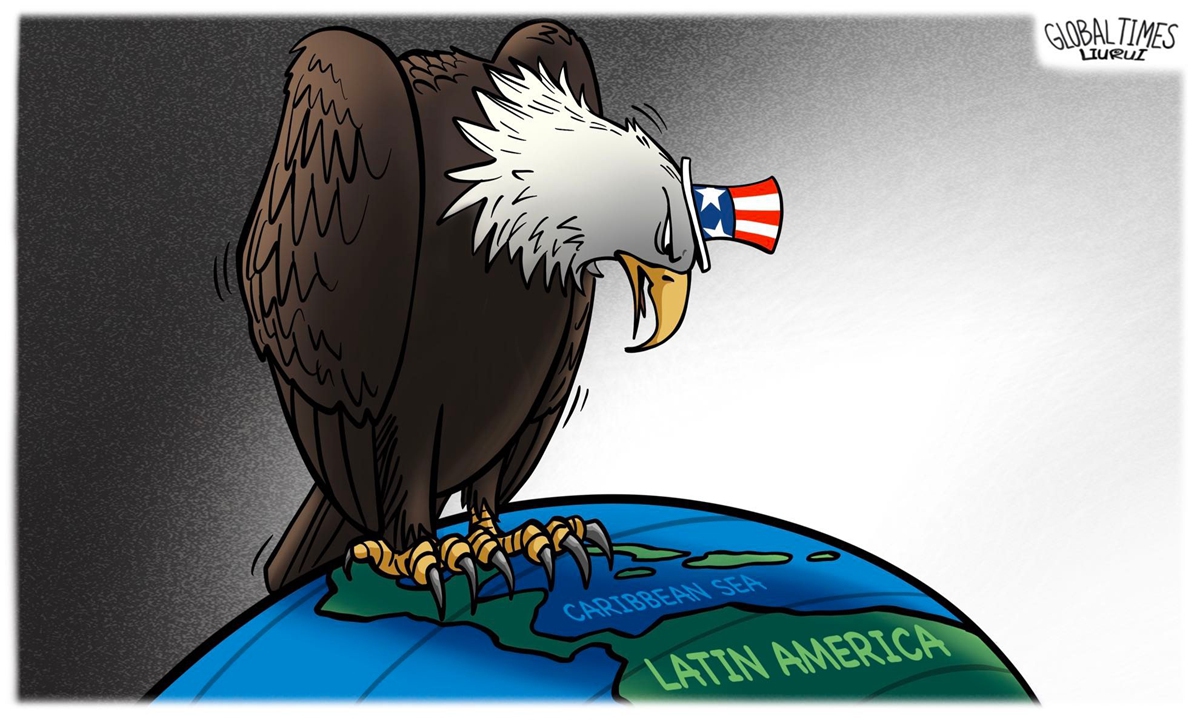
Illustration: Liu Rui/Global Times
On Sunday, US President Joe Biden became the first sitting US president to visit the Amazon rainforest. He sought to highlight his commitment to the preservation of the region. It can be said that Biden's visit to the Amazon region at the end of his term not only has multiple purposes, but also reveals some new trends in US policy toward Latin America.First, Biden's visit reflects that the US is paying attention to the concerns of Latin American countries, and tries to bring the US-Latin America relationship closer. Environment deterioration and climate change have become an important concern of regional countries. The Biden administration wants to demonstrate that it values the concerns of Latin American countries on environmental and climate change issues. In 2023, it promised to make a contribution of $500 million to the Amazon Fund. An additional $50 million contribution was announced on Sunday. The US president also launched a finance coalition seeking to spur at least $10 billion in public and private investment for land restoration and eco-friendly economic projects by 2030, making a grand promise to Latin American countries.
Second, Biden's visit to the Amazon is also a response to the environmental and climate demands of Latin American countries. In recent years, these issues have gained significant traction within the region, becoming central to the agendas of many governments. Take Brazil as an example. The country has prioritized tackling climate change, committing to a new model of global governance on climate issues and urging developed nations to fulfill financial commitments to support developing countries in their climate initiatives. Biden's Amazon visit is aimed at shaping the image of the US as a global leader in the fight against the environmental degradation and climate change.
Third, a fundamental purpose of Biden's trip to the Amazon is to maintain and enhance US influence in Latin America. Historically viewed as a traditional sphere of influence, the region has been a focal point of US foreign policy for many years. To maintain its hegemonic position and fundamental interests in Latin America, the US has constantly put forward new policies toward Latin America and tried its best to suppress the influence of other global powers in the region.
Through Biden's visit to the Amazon rainforest, Washington aims to demonstrate to Latin American countries that the US will continue to increase its strategic investment in the region and promote cooperation in various areas, including addressing the environmental and climate change issues. Meanwhile, the US seeks to maintain and enhance its influence in the region.
However, in terms of actual impact, Biden's visit resembles more of a "show." He visited the Amazon at the end of his term, resulting in limited concrete outcomes and practical effects. He made various commitments that are difficult to implement, which Latin American countries are also well aware of. Once the next US government comes to power, Washington's climate and environmental policy is likely to take a sharp turn. If that happens, Biden's promises will become nothing more than a "bad check."
No matter how US policies toward Latin America change, they will struggle to dissolve the deep-seated contradictions in bilateral relations. The US has put forward various plans and proposals to deepen cooperation with Latin America, which can alleviate regional countries' dissatisfaction with US intervention in their affairs and may even enhance their hope and enthusiasm for cooperating with Washington. However, the contradiction between the principle of "prioritizing US interests" and the construction of equal partnership is almost implacable.
Furthermore, the two sides don't completely see eye to eye on the priorities in their cooperation. Latin American countries hope to address their economic and social problems at home through cooperation with the US, while Washington emphasizes that bilateral cooperation should be subordinate to US national security interests. It is foreseeable that future cooperation between the US and Latin America will need to continue moving forward amid contradictions and conflicts.
The author is a senior professor at the Guangdong University of Foreign Studies and vice president of the Chinese Association for Latin American Studies. opinion@globaltimes.com.cn



